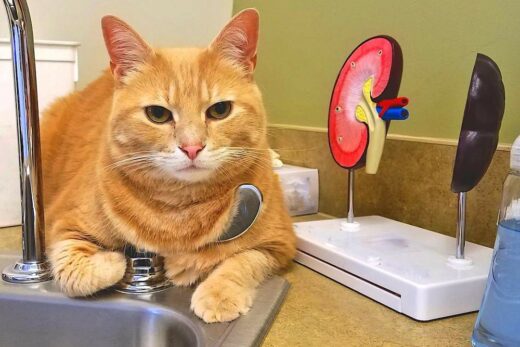Feline parvovirus is a virus that can cause cats a lot of discomfort. It is also known as feline panleukopenia, feline infectious enteritis (FIE), and feline distemper. Symptoms of feline parvovirus include diarrhea, vomiting, and fever. If left untreated, the virus can lead to severe illness and often proves fatal for kittens. Keep reading to find out not only how cats can get parvo, but also how you can protect your cat safe from parvo.
What Is Parvovirus (Parvo) In Cats?
Parvo is a highly contagious virus that infects host cells quickly in cats. The parvovirus mainly targets the cells in a cat’s intestines, which leads to vomiting, diarrhea, and a loss of appetite. However, parvo does not stop at infecting the intestines in cats; it can also go on to attack the bone marrow. Once this feline virus has spread to the cat’s or kitten’s bone marrow, it will lead to deficiency of white blood cells, red blood cells, and platelets.
Feline parvovirus is commonly found in most environments and can be extremely hard to eliminate. Most disinfectant products are ineffective against parvovirus, other than bleach, and it can survive even when exposed to hot and cold temperatures.
Kitten parvo is very common, with this contagious virus typically found in cats 3 to 5 months old. However, parvo is also very likely to affect unvaccinated cats and cats with underlying conditions that compromise their health.
How Can Cats Get Parvo?
Unfortunately, there are many ways in which a cat can contract parvovirus. The most common are excrement, urine, and nasal secretions that have come from other cats with the disease. On top of this, fleas can also pass on the virus from one cat to another. Due to this, parvovirus, or feline distemper, can contaminate a range of items and surfaces in and outside your home. Think of bedding, floors, cages, and clothes—it can very quickly spread everywhere.
Furthermore, the feline parvovirus can also be passed directly from one cat to another. However, this is much more common in areas with multiple cats, such as pet shops, animal shelters, and multi-cat households. Unfortunately, pregnant cats that contract the virus are known to give birth to kittens with brain damage that compromises the kittens’ ability to properly walk and eat.





